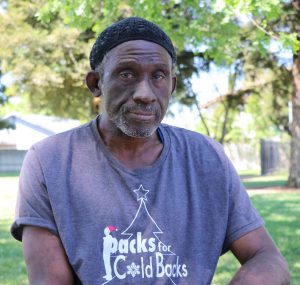
The Racial Equity Committee has a vision for a more equitable future for people experiencing homelessness in Sacramento. Building this future starts with listening to and learning from Black, Indigenous, and Other People of Color (BIPOC) who have lived experiences of homelessness.
To elevate their voices, this diverse committee has conducted a series of listening sessions with BIPOC with current and past experience of homelessness. This work helps us understand the nature of the barriers they have faced and take definitive steps to eliminate them.
Ultimately, these narratives will be woven into an action plan that will guide the actions of the Sacramento Continuum of Care (CoC).
Among those interviewed was Maurice Harge, who identifies as Native American and Haitian. The 63-year-old has experienced homelessness sporadically since 2005. He feels that the color of his skin has contributed to denials for housing and discrimination when receiving services. For Harge, who has a disability and a myriad of health conditions, living on the street has taken a serious toll.
He wants to see a focus on equity across the homeless response system. He wants to have faith that his race will not play a role in his interactions with providers.
“Equal access across the board – that’s where it starts,” said Harge, who is currently using motel vouchers for temporary shelter. “If you go into a place, people leave (their biases) in the glove compartment or at home.”
Confronting racial equity starts from a place of honesty. Sacramento Steps Forward and the CoC recognize that everyone has implicit bias.
To begin to build our community’s collective awareness, the Racial Equity Committee held a training on how implicit biases are made in our brains and expressed in our actions, creating advantages for some groups and disadvantages for others. This training included tools and techniques to reduce our susceptibility to both personal and institutional bias.
This training is just one component of creating a solid foundation of equity in our community. As it takes shape, the committee’s action plan could include recommendations for continued training and staff support to address bias and foster accountability.
The Racial Equity Committee also held an April 26 forum to hear the perspective of approximately 40 providers who serve BIPOC. Their voices will also be used to shape this action plan.
These listening sessions are invaluable in developing a shared understanding of where our system is, and how we need to improve it. Sacramento Steps Forward and the CoC are committed to driving this meaningful change in our community.

